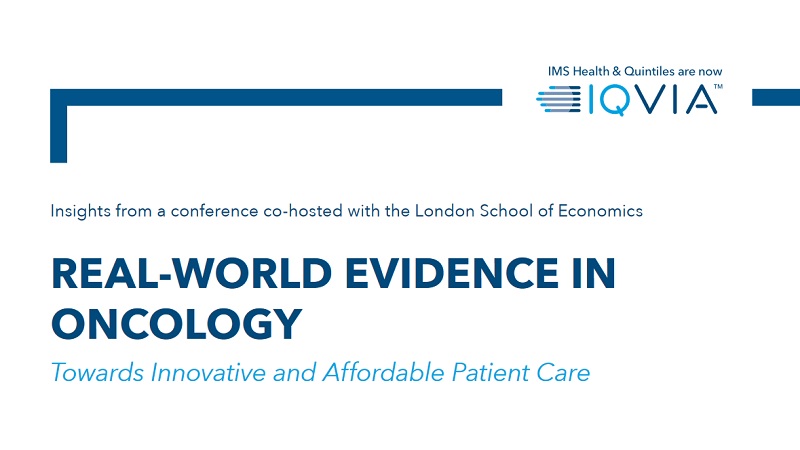Standing on the cusp of something great: How real-world data is poised to transform cancer care

REAL-WORLD EVIDENCE IN ONCOLOGY: Towards Innovative and Affordable Patient Care
How can real world evidence (RWE) improve the drug development pathway, from discovery to approval, and boost access to treatment? What are the challenges and barriers to using this data to guide reimbursement and design patient access schemes?
The UK is leading the way, particularly in oncology, but challenges exist, not least the need for high-quality, accessible, confidential data.
As we stand “on the cusp of something great”, IQVIA and the London School of Economics and Political Science hosted a meeting entitled Real-World Evidence in Oncology: Towards Innovative and Affordable Care to answer these and many more questions.
Held in London, it brought together experts from across the sector, including representatives from advocacy groups, Public Health England and NICE.
Speakers at the event included:
-
- Professor Alistair McGuire from the LSE
- Dr Helen Bulbeck, from the brain cancer charity Brainstrust and the patient movement Use MY Data
- Dr Jem Rashbass, Director for National Disease Registration at Public Health England
- Dr Linda Landells, Associate Director at the National Institute for Health and Care Excellence (NICE)
- Mackenzie Mills from the LSE
- Dr Sebastian Salas-Vega from the LSE
- Dr Ashley Woolmore from IQVIA
- Mr Peter Huskinson, National Commercial Director, Specialised Commissioning, at NHS England
- Professor Mark Caulfield, from Genomics England
- Dr Virginia Acha, from the Association of the British Pharmaceutical Industry (ABPI)
Plus an expert panel discussion with:
- Professor Mike Drummond (University of York)
- Mr Rob Kotchie (IQVIA)
- Dr Matthew Williams (Imperial College, London)
- Pesh Doubleday (Public Health England)
- and Peter Huskinson
Based on the learnings, this conference report event explains who are currently using RWE, what the future might hold and how to overcome the many challenges.
Download your copy to discover:
-
- how RWE is being used to improve access to care
- how you can use RWE to complement RCT data
- how RWE is boosting the quest for personalised cancer treatments and informing the entire drug development pathway
- how RWE can be used to guide decisions on reimbursement and value-based pricing
- the limitations of RWE, including patient confidentiality, data quality and accessibility, and how they can be overcome
A sample of the insights on offer:
“ The more data we can share in a secure and standardised manner, the fewer people will die or have harmful interventions.” (Dr Helen Bulbeck)
“We have the best, largest, and most real-time data set in the world for cancer, but it is essential to use this sensitively.” (Dr Jem Rashbass)
“ Education and increased awareness of the importance of RWE were considered to be key to overcoming barriers.” (Mackenzie Mills)
“ The ambition is to make the UK knowledge base in genomics “the best in the world.” (Professor Mark Caulfield)
“ We are on the cusp of something great in terms of precision medicine, although at present the benefits may be greater in haematological malignancies than in solid tumours.” (from the panel discussion)
"It is essential that the use of RWE should not compromise patients’ confidentiality. When using RWE, the rights of the individual must be balanced against the overall benefit to society.”(from the panel discussion)
For further content relating to oncology trials – please click here.












